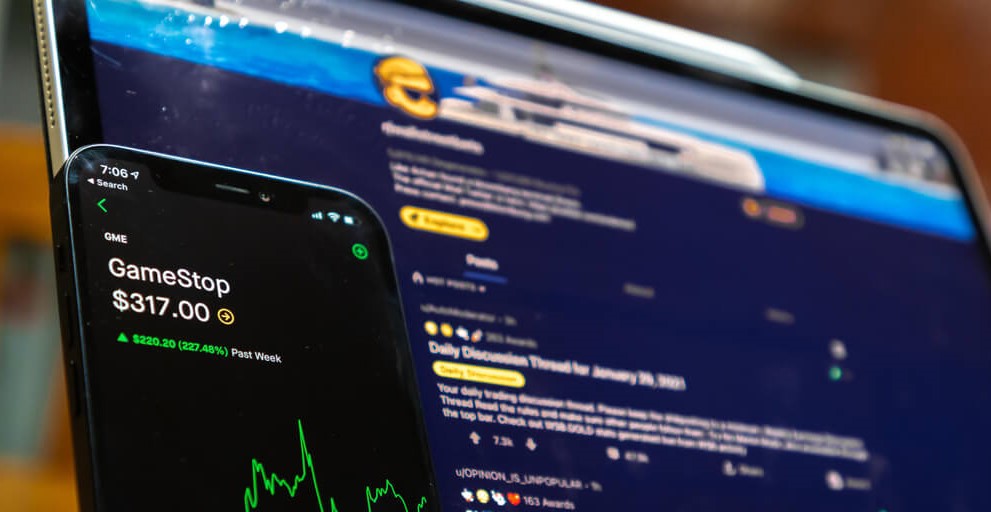As I write this on Monday, GameStop (NYSE: GME) shares are down about 30%.
But before we stick a fork in it and say it’s done, I should point out that this stock has seen wilder swings over the past week before going sharply higher. So, while I believe this squeeze is probably over, that is by no means certain.
Short interest in the stock has dipped to about 39% of the float, according to Bloomberg, down from 140% earlier in January. That’s still ridiculously high, of course, but it shows that short sellers are slowly draining out of their positions.
This whole exercise has left a massive mess behind it. Melvin Capital, one of the leading shorts in the stock, reportedly lost 53% of its value in January. Republicans and Democrats are calling for investigations into the whole affair, including the decision by several brokers to halt trading. I personally believe that a lot of the volatility in the market last week was due to hedge funds selling their winning positions in order to cover losses in their blown-out short books from GameStop and other squeezed stocks.
The question is, “what happens next?”
The Next Short Squeeze Target
Now that they’ve tasted blood, the retail traders on Reddit are searching out new targets. Silver prices spiked Monday on a similar short squeeze thesis.
While I like silver — I’ve been recommending investors carve out a little room for precious metals and other long-term inflation hedges for months — I’d steer clear of the short squeeze thesis here. Yes, there is a large short position in silver. But there always is, and that’s normal for commodities. Producers and commercial hedgers regularly short silver as a way to lock in prices and reduce their exposure to price spikes. Large speculators are actually net long silver at the moment, so the idea of sticking it to the man on Wall Street doesn’t really hold here.
But there’s a story here that is much bigger than GameStop and much bigger than silver.
The GME Stock Shockwave
Some of the most powerful hedge funds in the world were just humiliated by a scrappy group of do-it-yourself retail investors, for crying out loud.
Social media upended the traditional power structure in Washington, D.C., as we saw when Donald Trump won the Republican primaries and then later the Presidency in 2016. Love the man or hate him, you can objectively look at his campaign and prove it was a wildly effective social media marketing plan. The idea of a third party coming out of nowhere and challenging the Democrats or Republicans was a fantasy just a short time ago. Now, that’s not only possible but likely.
Likewise, as financial data has become abundant and cheap (if not actually free in a lot of cases) and trading costs at effectively zero, we’re seeing similar dynamics in the financial markets.
Back in 1998, Alan Greenspan made a backroom deal with the major Wall Street banks to keep the hedge fund Long-Term Capital Management from blowing up. That likely wouldn’t be possible today. Some of the most powerful hedge funds in the world were just humiliated by a scrappy group of do-it-yourself retail investors, for crying out loud. The idea that Wall Street can manage things as they used to is ridiculous at this point.
So, what should we do about it?
Wall Street Isn’t as Exclusive as It Once Was
I’ll admit that I’m not real comfortable with the idea of an internet mob running the world. But there are some takeaways.
To start, it‘s obvious that Wall Street doesn’t have the information advantage it used to. The Reddit group used easily accessible public data to identify the short squeezes. And it worked. If it worked for them, it can work for you.
Our own Adam O’Dell has been smoking Wall Street for over a decade using data he pulled from publicly-available sources.
Secondly, it’s important to have a good understanding of how the market works, and by that, I mean the underlying plumbing. The Reddit traders were smart enough to understand the dynamics of a short squeeze. A trader with less of an understanding of how markets actually function would have missed that opportunity or might have found themselves on the wrong side of it. I covered the risk of short squeezes last week when the GME trade was ramping up.
By the way, while we weren’t in the GameStop trade, Adam and I identified another short squeeze candidate in the December issue of Green Zone Fortunes. Our readers saw gains of more than 100% in a little over a month. If you want to see what that pick was and how you can gain access to our highest-conviction stock recommendations each month, check out Adam’s Millionaire Master Class here.
To safe profits,

Charles Sizemore is the editor of Green Zone Fortunes and specializes in income and retirement topics. Charles is a regular on The Bull & The Bear podcast. He is also a frequent guest on CNBC, Bloomberg and Fox Business.





